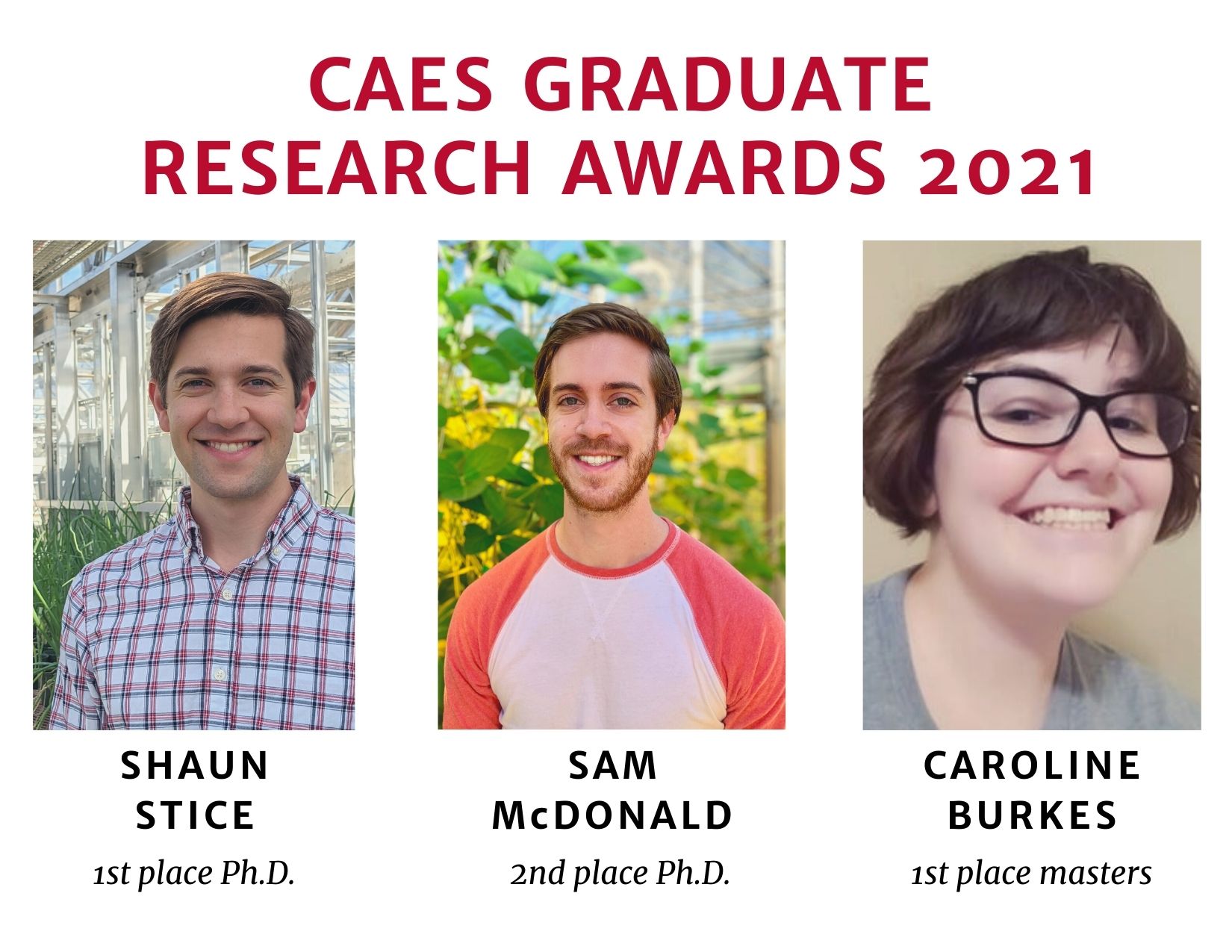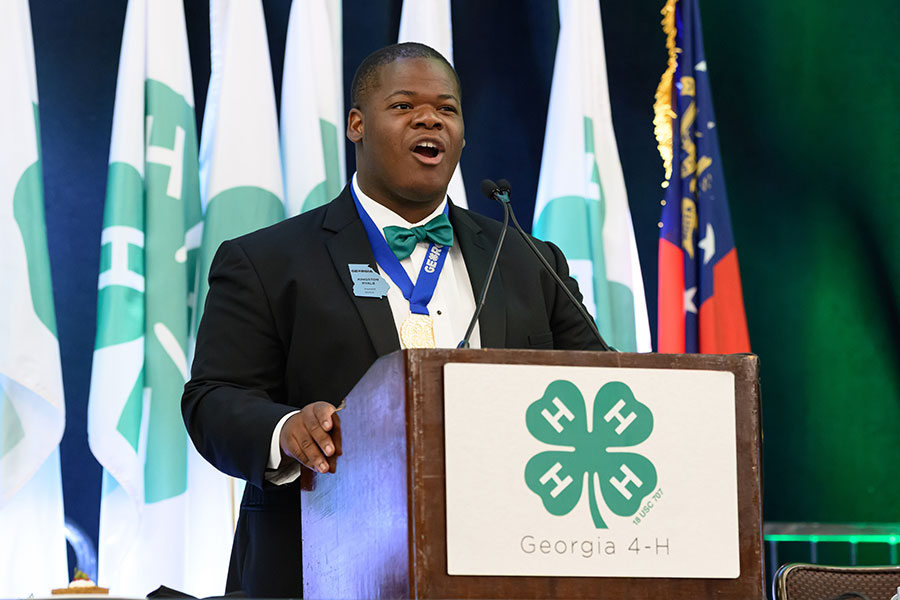Three graduate students in the University of Georgia College of Agricultural and Environmental Sciences (CAES) have been honored with an E. Broadus Browne Award for Outstanding Graduate Research.
Given in honor of Browne, a former director of the Georgia agricultural experiment stations in the college, the award is presented to outstanding master’s and doctoral students based on research and effective communication.
Shaun Stice took first place in the Ph.D. category. He is graduating in May 2021 with a doctorate in plant pathology under guidance from advisors Brian Kvitko and Bhabesh Dutta. He hails from Salem, Oregon, and received an undergraduate degree in biology from the University of Portland.
Sam McDonald, a third-year Ph.D. student in the Institute of Plant Breeding, Genetics and Genomics, took second place. His advisor is Zenglu Li. A native of Silex, Missouri, he received an undergraduate in plant science from the University of Missouri.
Caroline Burks received first place in the master’s category and is graduating in May 2021 with a master’s in plant pathology under the direction of Marin Brewer. Her undergraduate degree is in bioenvironmental sciences from Texas A&M University, a few hours away from her hometown of Fort Worth, Texas.
The first-place doctoral award consists of a certificate, $2,000 and up to $1,500 for support to attend a professional meeting or publication. Second place is awarded $1,000. The first-place master’s award consists of a certificate, $1,000 and up to $1,500 in support to attend a professional meeting or publication.
The top winners in each category describe more about their time at UGA in the following Q&A.
What inspired you to come to UGA?
SS: I participated in a summer scholar research program in plant pathology during my undergrad and thoroughly enjoyed the experience. This led me to pursue plant pathology programs across the country. The other graduate programs I had offers from centered on well-characterized model bacteria, whereas the research project in Georgia focused on an understudied bacterium that causes great losses for onion growers in the state. It was a new problem that hadn’t been looked at in detail before.
CB: I came to work with Marin Brewer who is a very well-known mycologist so that I could learn more about fungi and how they can affect our agricultural production.
What is your research about, and what are the potential impacts?
SS: We uncovered this interesting chemical interaction between the bacterial pathogen, Pantoea ananatis, and onions. The bacteria produce a toxin that kills onion cells, and when onion cells die they produce potent antimicrobial chemicals. I discovered that certain strains of P. ananatis have a genetic mechanism that allows them to tolerate or resist these antimicrobial chemicals. These strains have an enhanced ability to colonize the onion bulb and cause center rot disease. Sweet onions are known to have lower levels of these defensive compounds. We’re currently looking at different onion varieties and that may have higher concentrations of defensive chemicals to see if they are more resistant to the bacteria. Now that we understand how the bacteria are killing the onion, we have better information for breeders and growers to figure out how to resist the pathogen.
CB: I am researching a human pathogen, Aspergillus fumigatus, that causes aspergillosis. Aspergillosis is a spectrum of respiratory illnesses that can cause different symptoms in people with pre-existing conditions and people with compromised immune systems and can be very dangerous if it goes untreated. It’s also only acquired from the environment and not transferred from person to person. A. fumigatus is also a decomposer in the environment — it doesn’t require a human host to live. Recently, people have been diagnosed with aspergillosis that is resistant to azoles, the main drug to treat it. It was suspected that this resistance arose in the environment instead of in people, and so our lab has looked at soil in agricultural environments to see if the resistance is present there. We found that it is, so my research is focused on looking at products that come from agricultural environments (fruit, nuts, compost and flowers). If I find resistant A. fumigatus on these products, it could pose a major risk to immunocompromised people who are exposed to those products. The actual risk has not been quantified yet.
What has been your favorite part about UGA or CAES?
SS: We have a great community of researchers here at Georgia in plant sciences and plant pathology concentrated in one building. There are events such as the Plant Center fall retreat and spring symposium where you get the chance to interact and develop collaborations with other members of the plant science community at UGA. Our plant pathology department is unique too. A lot of state universities have consolidated to put plant pathology in other departments, It’s nice that we have such a large robust plant pathology department with a wide range of expertise ranging from applied to basic research. In UGA’s plant pathology department you have opportunities to build new skills and gain broad training in the field. There’s an emphasis to develop us as well-rounded plant pathologists.
The university offers so many opportunities to fund travel for research, national and international meetings. I used an award from the Graduate School to visit one of my committee members in South Africa. I got to try out some molecular tests on their bacterial collection and teach them some of our techniques to delete bacterial genes. It was an awesome experience.
CB: I love the community of the plant pathology department and the collaboration that can occur in Miller Plant Sciences. We come into contact with members of plant biology and crop and soil sciences all the time which allows for a lot of communication and collaboration. There is also the UGA fungal group, that meets every week to discuss research in the fungal field from a variety of different departments.
What are your future career goals?
SS: I’m hoping to find a position within the U.S. Department of Agriculture Agricultural Research Service or potentially academia. I’m probably going to do a postdoc to broaden my skill set and get experience with grant writing.
CB: I am looking to teach biology, plant science and/or mycology at the undergraduate level someday, after achieving my Ph.D. and acquiring more teaching and research experience.
How do you plan to use your award?
SS: I will probably be using the funds for publication fees.
CB: I plan to attend the Genetics Society of America Fungal Genetics Conference in California in March 2022.
For more information on graduate programs in CAES, visit caes.uga.edu/students/graduate-programs.




